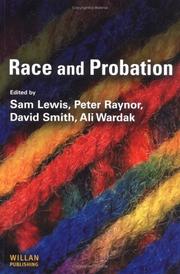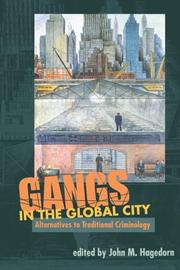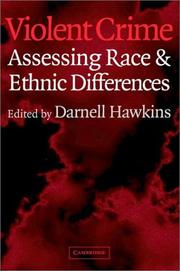| Listing 1 - 10 of 20 | << page >> |
Sort by
|

ISBN: 184392143X Year: 2006 Publisher: Cullompton Willan
Abstract | Keywords | Export | Availability | Bookmark
 Loading...
Loading...Choose an application
- Reference Manager
- EndNote
- RefWorks (Direct export to RefWorks)
Crime and race --- Probation --- Race and crime --- Race-crime relationships --- Race

ISBN: 1134042353 128223790X 9786612237904 1843926644 9781134042357 9781843926641 184392143X 9781843921431 9781134042494 1134042493 9781134042425 1134042426 9781138415836 1138415839 Year: 2006 Publisher: Cullompton, UK ; Portland, Or. : Willan,
Abstract | Keywords | Export | Availability | Bookmark
 Loading...
Loading...Choose an application
- Reference Manager
- EndNote
- RefWorks (Direct export to RefWorks)
The issue of minority ethnic groups' experiences of the criminal justice process, and in particular whether they are subject to disadvantageous treatment, has received much attention in recent years following high-profile events such as the publication of the Macpherson report in 1999 and the riots involving British-born Asian youths in northern towns in 2001. At the same time there has been a burgeoning body of research evidence about the needs and experiences of minority ethnic offenders, the behaviour of racially motivated offenders, and concern with 'What Works' to reduce recidivism by
Crime and race --- Probation --- Race and crime --- Race-crime relationships --- Race
Book
ISBN: 9781409407492 9781409407508 1409407500 1409407497 1317072154 1282963317 9786612963315 9781315603391 9781317072140 9781317072157 9781138268289 1317072162 131560339X Year: 2011 Publisher: Farnham : Ashgate,
Abstract | Keywords | Export | Availability | Bookmark
 Loading...
Loading...Choose an application
- Reference Manager
- EndNote
- RefWorks (Direct export to RefWorks)
In the course of the last two decades, the number of arrests, imprisonment and detention of aliens and citizens of foreign origin has increased significantly in the West. This volume examines this growing trend towards racial criminalization and victimiza
Crime and race --- Racism --- Immigrants --- Race and crime --- Race-crime relationships --- Race --- Crime and race - Europe --- Racism - Europe --- Immigrants - Europe
Book
ISBN: 9781843923961 9781843925453 9781134003716 9781134003785 9781134003853 9781843923978 Year: 2008 Publisher: Cullompton : Willan Publishing,
Abstract | Keywords | Export | Availability | Bookmark
 Loading...
Loading...Choose an application
- Reference Manager
- EndNote
- RefWorks (Direct export to RefWorks)
Crime and race. --- Emigration and immigration --- Gangs. --- Juvenile delinquency. --- Social aspects. --- Crime and race --- Gangs --- Juvenile delinquency --- Delinquency, Juvenile --- Juvenile crime --- Conduct disorders in children --- Crime --- Juvenile corrections --- Reformatories --- Crews (Gangs) --- Crime syndicates --- Street gangs --- Teen gangs --- Teenage gangs --- Criminals --- Juvenile delinquents --- Hoodlums --- Race and crime --- Race-crime relationships --- Race --- Social aspects --- Délinquance juvénile --- Émigration et immigration --- Crimes et criminels --- Aspect social --- Approche raciale
Book
ISBN: 9780814776155 0814776159 9780814776162 0814776167 9780814776476 0814776477 0814777481 Year: 2010 Publisher: New York : New York University Press,
Abstract | Keywords | Export | Availability | Bookmark
 Loading...
Loading...Choose an application
- Reference Manager
- EndNote
- RefWorks (Direct export to RefWorks)
From Rodney King and “driving while black” to claims of targeting of undocumented Latino immigrants, relationships surrounding race, ethnicity, and the police have faced great challenge. Race, Ethnicity, and Policing includes both classic pieces and original essays that provide the reader with a comprehensive, even-handed sense of the theoretical underpinnings, methodological challenges, and existing research necessary to understand the problems associated with racial and ethnic profiling and police bias. This path-breaking volume affords a holistic approach to the topic, guiding readers through the complexity of these issues, making clear the ecological and political contexts that surround them, and laying the groundwork for future discussions. The seminal and forward-thinking twenty-two essays clearly illustrate that equitable treatment of citizens across racial and ethnic groups by police is one of the most critical components of a successful democracy, and that it is only when agents of social control are viewed as efficient, effective, and legitimate that citizens will comply with the laws that govern their society. The book includes an introduction by Robin S. Engel and contributions from leading scholars including Jeffrey A. Fagan, James J. Fyfe, Bernard E. Harcourt, Delores Jones-Brown, Ramiro Martínez, Jr., Karen F. Parker, Alex R. Piquero, Tom R. Tyler, Jerome H. Skolnick, Ronald Weitzer, and many others.
Racial profiling in law enforcement. --- Police --- Crime and race. --- Attitudes. --- Profiling, Racial, in law enforcement --- Law enforcement --- Police psychology --- Race and crime --- Race-crime relationships --- Race --- Ethnicity. --- Policing. --- Race. --- associated. --- bias. --- both. --- challenges. --- classic. --- comprehensive. --- essays. --- ethnic. --- even-handed. --- existing. --- includes. --- methodological. --- necessary. --- original. --- pieces. --- police. --- problems. --- profiling. --- provide. --- racial. --- reader. --- research. --- sense. --- that. --- theoretical. --- underpinnings. --- understand. --- with.
Book
ISBN: 0875869173 9780875869179 9780875869155 0875869157 9780875869162 0875869165 Year: 2012 Publisher: New York : Algora Pub.,
Abstract | Keywords | Export | Availability | Bookmark
 Loading...
Loading...Choose an application
- Reference Manager
- EndNote
- RefWorks (Direct export to RefWorks)
This fresh new textbook to balance theory and the real world, addressing topics relating to race, ethnicity, criminality and criminalization, looking at the criminal justice system, the media, and the death penalty. In addition to information on crime and incarceration rates, White-collar crime, and the "typical criminal," the discussion of minorities and public perceptions is set within a broader context including the issues of terrorism and human trafficking, where race and ethnicity are also vital to public perceptions.
Race. --- Crime and race. --- Ethnicity. --- Mass media and race relations. --- Justice, Administration of. --- Administration of justice --- Justice, Administration of --- Law --- Courts --- Mass media and race problems --- Race relations and mass media --- Race relations --- Ethnic identity --- Group identity --- Cultural fusion --- Multiculturalism --- Cultural pluralism --- Race and crime --- Race-crime relationships --- Race --- Physical anthropology --- Law and legislation
Book
ISBN: 1452266093 1849727791 1412971926 9781452266091 9781412971928 9781412950855 1412950856 9781849727792 Year: 2009 Publisher: Los Angeles : SAGE,
Abstract | Keywords | Export | Availability | Bookmark
 Loading...
Loading...Choose an application
- Reference Manager
- EndNote
- RefWorks (Direct export to RefWorks)
Comprehensive in nature, these two volumes cover a number of broad thematic areas including basic concepts and theories of criminal justice, juvenile justice, public policy, the media specific groups and populations, and much more.
Crime and race --- Criminal justice, Administration of --- Discrimination in criminal justice administration --- Minorities --- Ethnic minorities --- Foreign population --- Minority groups --- Persons --- Assimilation (Sociology) --- Discrimination --- Ethnic relations --- Majorities --- Plebiscite --- Race relations --- Segregation --- Race discrimination in criminal justice administration --- Administration of criminal justice --- Justice, Administration of --- Crime --- Criminal law --- Criminals --- Race and crime --- Race-crime relationships --- Race --- Law and legislation
Book
ISBN: 128389890X 0812206339 0812223179 0812244222 Year: 2012 Publisher: University of Pennsylvania Press
Abstract | Keywords | Export | Availability | Bookmark
 Loading...
Loading...Choose an application
- Reference Manager
- EndNote
- RefWorks (Direct export to RefWorks)
From Puritan Execution Day rituals to gangsta rap, the black criminal has been an enduring presence in American culture. To understand why, Jeannine Marie DeLombard insists, we must set aside the lenses of pathology and persecution and instead view the African American felon from the far more revealing perspectives of publicity and personhood. When the Supreme Court declared in Dred Scott that African Americans have "no rights which the white man was bound to respect," it overlooked the right to due process, which ensured that black offenders-even slaves-appeared as persons in the eyes of the law. In the familiar account of African Americans' historical shift "from plantation to prison," we have forgotten how, for a century before the Civil War, state punishment affirmed black political membership in the breach, while a thriving popular crime literature provided early America's best-known models of individual black selfhood. Before there was the slave narrative, there was the criminal confession. Placing the black condemned at the forefront of the African American canon allows us to see how a later generation of enslaved activists-most notably, Frederick Douglass-could marshal the public presence and civic authority necessary to fashion themselves as eligible citizens. At the same time, in an era when abolitionists were charging Americans with the national crime of "manstealing," a racialized sense of culpability became equally central to white civic identity. What, for African Americans, is the legacy of a citizenship grounded in culpable personhood? For white Americans, must membership in a nation built on race slavery always betoken guilt? In the Shadow of the Gallows reads classics by J. Hector St. John de Crèvecoeur, Edgar Allan Poe, Frederick Douglass, Herman Melville, George Lippard, and Edward Everett Hale alongside execution sermons, criminal confessions, trial transcripts, philosophical treatises, and political polemics to address fundamental questions about race, responsibility, and American civic belonging.
African Americans in literature --- American literature --- African Americans --- Crime and race --- Citizenship --- Afro-Americans in literature --- Negroes in literature --- Afro-Americans --- Black Americans --- Colored people (United States) --- Negroes --- Africans --- Ethnology --- Blacks --- Race and crime --- Race-crime relationships --- Race --- History and criticism. --- African American authors --- Race identity --- History. --- Legal status, laws, etc. --- Black people --- American History. --- American Studies. --- Cultural Studies. --- Human Rights. --- Law. --- Literature.

ISBN: 9780252073373 0252030966 9780252030963 0252073371 Year: 2007 Publisher: Urbana University of Illinois press
Abstract | Keywords | Export | Availability | Bookmark
 Loading...
Loading...Choose an application
- Reference Manager
- EndNote
- RefWorks (Direct export to RefWorks)
Crime and globalization --- Crime and race --- Criminology --- Gangs --- 844.6 Samenlevingsproblemen --- 846 Etniciteit --- Crews (Gangs) --- Crime syndicates --- Street gangs --- Teen gangs --- Teenage gangs --- Criminals --- Juvenile delinquents --- Hoodlums --- Crime --- Social sciences --- Race and crime --- Race-crime relationships --- Race --- Globalization and crime --- Globalization --- Philosophy --- Study and teaching --- Crime and globalization. --- Crime and race. --- Gangs. --- Philosophy.

ISBN: 0521626749 0521622972 1107127874 051117988X 0511066031 0511059728 0511323808 0511499450 1280417404 1139145800 0511068166 9780511066030 9780521622974 9780511499456 9780511068164 9781280417405 9786610417407 6610417407 9780521626743 9780511323805 9781107127876 9781139145800 9780511059728 Year: 2003 Publisher: Cambridge Cambridge University Press
Abstract | Keywords | Export | Availability | Bookmark
 Loading...
Loading...Choose an application
- Reference Manager
- EndNote
- RefWorks (Direct export to RefWorks)
Analysts have long noted that some societies have much higher rates of criminal violence than others. They have also observed that the risk of being a victim or a perpetrator of violent crime varies considerably from one individual to another. In societies with ethnically and racially diverse populations, some ethnic and racial groups have been reported to have higher rates of violent offending and victimization than other groups. This exceptional collection of original essays explores the extent and causes of racial and ethnic differences in violent crime in the United States and several other contemporary societies, including Canada, New Zealand, and England. The authors critically examine the credibility of the evidence of group differences in rates of violent crime and debate the merits of many of the popular theories that have been put forth to explain them.
Crime and race --- United States --- Minorities --- Crimes against --- Violent crimes --- Race relations --- Ethnic relations --- Crimes, Violent --- Crimes of violence --- Crime --- Violence --- Ethnic minorities --- Foreign population --- Minority groups --- Persons --- Assimilation (Sociology) --- Discrimination --- Majorities --- Plebiscite --- Segregation --- Crimes against minorities --- Minority victims of crime --- Race and crime --- Race-crime relationships --- Race --- Ethnic relations. --- Race relations. --- Race question --- Crime and race. --- Violent crimes. --- Crimes against. --- Criminalité et race --- Crimes violents --- Etats-Unis --- Relations raciales --- Relations interethniques --- Social Sciences --- Sociology
| Listing 1 - 10 of 20 | << page >> |
Sort by
|

 Search
Search Feedback
Feedback About UniCat
About UniCat  Help
Help News
News